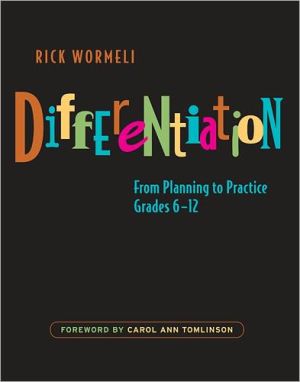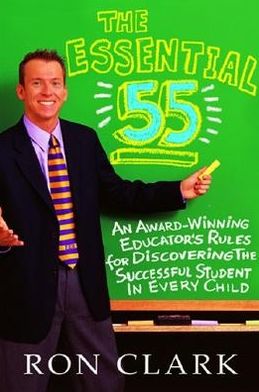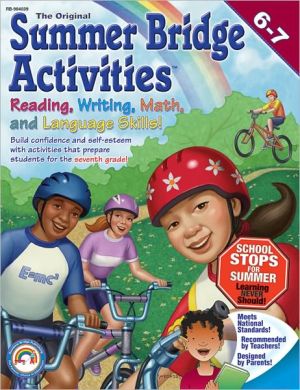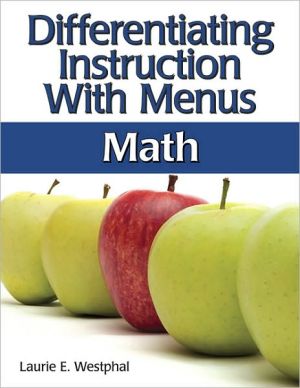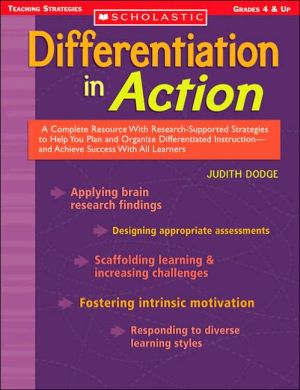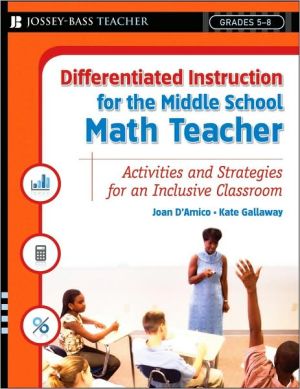Differentiation: From Planning to Practice
In this refreshing addition to differentiated learning literature, Rick Wormeli takes readers step-by-step from the blank page to a fully crafted differentiation lesson. Along the way he shows middle and high school teachers and behind-the-scenes planning that goes into effective lesson design for diverse classrooms.\ Rick demonstrates how to weave common and novel differentiation strategies into all subjects and offers clear advice about what to do when things don't go as expected. Based on...
Search in google:
In this refreshing addition to differentiated learning literature, Rick Wormeli takes readers step-by-step from the blank page to a fully crafted differentiation lesson. Along the way he shows middle and high school teachers the behind-the-scenes planning that goes into effective lesson design for diverse classrooms. Rick demonstrates how to weave common and novel differentiation strategies into all subjects and offers clear advice about what to do when things don't go as expected. Based on nearly thirty years of experience as a teacher and instructional coach, Rick's thoughtful and imaginative classroom accommodations will help teachers succeed with advanced students, struggling students, English language learners, and students across the multiple intelligences spectrum. A thorough and practical guide, Differentiation: From Planning to Practice also provides an overview of the cognitive science behind differentiation as well as more than two-dozen tools that make differentiation doable in the classroom. This is an essential resource for all reflective teachers.
Foreword xiAcknowledgments xvDeveloping a Common Frame of Reference 1Rationale 1Differentiated Instruction in the Classroom 4Defining Differentiated Instruction 7How to Extend These Processes to Any Subject 12A Walk-Through of a Differentiated Lesson 15Overview 15Steps to Take Before Designing the Learning Experiences 17Steps to Take While Designing and Implementing the Learning Experiences 31Sample Lesson: The Impact of Cortez on the Aztecs 42Focus 42Specific Objectives 42Assessments 42Materials 43Learning Experiences and Sequence 43Differentiation Alternatives for Each Part 46Responding to the Needs of Advanced Students 48Differentiating in Advanced Placement and International Baccalaureate Classes 52Three Questions to Guide Our Brainstorming of Lesson Modifications 53Changing Our Lesson Plans As We Respond to Students 53Reminders When Reviewing Our Differentiated Lesson 59Steps to Take After Providing the Learning Experiences 62Helpful Structures and Strategies for the Differentiated Class 65General Differentiation Approaches 65Different, Not More or Less 65Adjusting Instruction Based on Assessment Results 67Modify Options: Content, Process, Product, Affect, and Learning Environment 70Models of Instruction 72Flexible Grouping 75Collaboration with Students 79Personal Agendas 79Tiering 81A Slightly Different Definition 81Tomlinson's Equalizer 81Gradations of Mastery 83Respectful Tasks 89Compacting the Curriculum 90The Football and the Anchor: Teaching a Variety of Levels at the Same Time 91Scaffold Instruction 97Cognitive Science Structures and Tips That Help Us Differentiate 99Building Background Knowledge 100Priming the Brain and Structuring Information 100Primacy-Recency Effect 102Explore Similarities and Differences, Examples and Nonexamples 104Hydration 104Emotional Content 105Novelty 107Meeting Survival Needs 108Memory Ideas 109Social Interaction 110Twelve Samples of Differentiated Learning Experiences from Multiple Subjects 115Newton's First Law 115Sums of Interior Angles 117Learning from Lectures 120Physical Education Skills 121Art Skills 122Simplifying Square Roots 123Editing Text 126Show, Don't Tell 127Calculating Simple Interest 129Atomic Structure 131Taxonomic References with English Language Learners 132Students Can't Sit Still 134A Few Quick Reminders 137A Final Word: Three Tips to Begin the Journey 139Recommended Resources 143Appendix 153References 165Index 169
